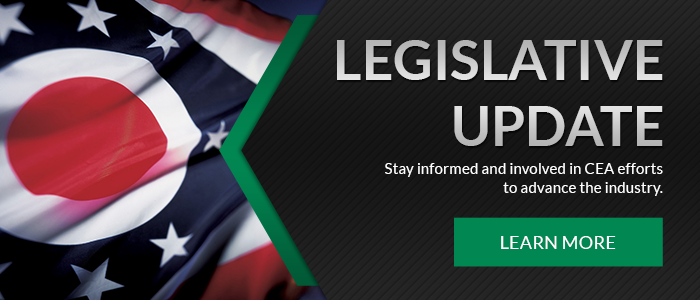Legislative Update - July 13, 2018

At a prior meeting, a substitute bill was accepted. The changes eliminated a requirement that each agency set goals for procurement utilizing certified women-owned businesses. HB 492 now creates a program similar to one used in Kentucky in which a certification process would be created by rules promulgated by the Department of Administrative Services. The goal of the legislation is to get a web-based certification process in place and allow DAS to enter into reciprocal agreements related to the women-owned businesses with other states. For more information, please see the link to the bill.
The Associated Builders and Contractors (ABC), Ohio Manufacturers Association, and the NFIB testified for the bill. The bill would allow sixteen and seventeen year olds to work on construction and manufacturing job sites. The 16-17 year olds would have to go through this training.
Other provisions include: the employer paying any costs associated with providing the training and the Ohio Department of Commerce making rules specifying a list of tools 16-17 years may operate.
Late in June session, the bill was up for a third hearing and possible vote out of the House Economic Development Commerce and Labor Committee. CEA had concerns with the bill and issued opponent testimony. Please see attached. Due to CEA’s testimony and others that had concerns, the bill was not voted out of committee.
The bill had a couple hearings in 2017. The Iron Workers District Council and an Ironworker apprenticeship instructor have testified on the bill. After a pause in hearings, on 6/28/18 the bill had a hearing in the House Economic Development and Commerce and Labor Committee. A substitute bill was accepted, and the bill was reported out of committee. It awaits a full House vote. The bill would then have to go over to the Senate. Some of the changes in the substitute bill include:
- Transfers responsibility for implementing the legislation from the Board of Building Standards to the superintendent of industrial compliance.
- Requires the superintendent or a building official certified by him or her to enforce the new welding standards.
- Authorizes the superintendent to certify local building departments, personnel and private firms to conduct inspections of the welding standards.
- Eliminates references to bridge welding, rendering the bill only applicable to structural welding. Exempts from the bill's structural steel welding requirements certain buildings and any welding that is required by the American Society of Mechanical Engineers to have its own certification.
- Enables a locality without a certified department to adopt another department or private third party to do the inspections or enforcement.
- Allows the superintendent to investigate departments and revoke certifications.
- Allows the superintendent to adopt rules to implement the bills, govern inspections and record keeping, establish fees, implement and administer the bill's provisions.
- Requires a contractor, subcontractor, or project manager who is responsible for the structural steel welding on a construction project to ensure that standards related to welding and welding inspections be met in all construction projects covered by the bill.
- Authorizes the Superintendent of Industrial Compliance to certify municipal, township, and county building departments or private third parties to inspect structural steel welding projects to determine that the welding complies with the bill's requirements
For more information, please see the bill analysis attached here:
